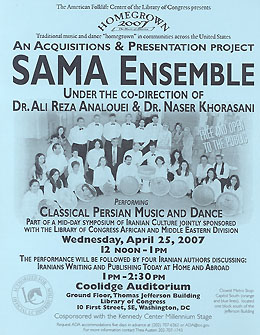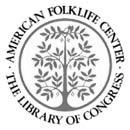| |
|||
|
The American Folklife Center at the Library of Congress presentsThe Homegrown 2007 Concert Series
|

|
A musical life is a journey where one meets fellow travelers, and gains entry into marvelous things opportunities, relationships and adventures that resound with the fullness of human possibility. For the Sama Ensemble the road its members travel is shaped by the Persian traditions of their cultural home. These traditions mean so much to expatriates here in America, a land of possibility and fulfillment, but also a land where it takes effort and creativity to stay connected to what may matter most.
One of the remarkable journeys in the Sama Ensemble is that of Naser Khorasani, director of the Daf division of the group. Khorasani was born in 1971 and grew up in an Azeri family in Tabriz,an ancient city of artists and poets in the far northwestern corner of Iran.At age fourteen he began the serious study of the santur, the beautiful hammered dulcimer of the Persian tradition.These were heady times for traditional and classical forms in Iran. As Khorasani put it: “After the Iranian revolution, music grew up in Iran.” The Iranian Revolution included a rejection of modern popular culture and more generous support for local forms.
At seventeen, his life changed forever when he met his master, Masoud Habibi. A musical genius, steeped in both western and Persian music, Habibi became the leading figure in Iran bringing the daf into the art music tradition and developing a study curriculum. Inspired by the charismatic teaching and artistry of Habibi, Khorasani traveled the four hundred miles from Tabriz to Tehran to take lessons, until at nineteen he moved to the Iranian capital, both to study music with his master and to study psychology at the University of Tehran, where he eventually received a masters degree.
|
In Tehran with Habibi, Khorasani grew enormously as a musician. This was an exciting period, as under the tutelage of his master, he absorbed the emerging repertoire of Habibi and other composers who developed the daf as the basis for large and dramatic percussion orchestras. At the same time he also connected with the ancient and powerful traditions of the daf as a key tool in the mystical spirituality of the Sufi tradition. Sufis practice a form of Islam shaped by religious experience and personal spiritual insight.The ancient daf, a large booming frame drum festooned with jangling rings, is essential to Sama, the ecstatic ritual of chanting, movement and rhythm through which Sufis connect to the divine.
For Khorasani, his love of music led him to Sama and the insights he gained from this powerful form shaped his psychological research and practice leading to breakthroughs in using music to treat schizoid conditions. As Habibi's beloved protégé and the manager of Habibi's Ensemble, he traveled the world with him performing at International Sufi festivals throughout Asia and on nationally broadcast concerts in Iran.
Khorasani's personal journey brought him to America in 2004 where he settled in Maryland's Germantown and quickly connected to the thriving Iranian musical community already present in the Maryland/DC/Virginia region. Here, he joined forces with musician and cultural leader Dr. Ali Reza Analouei. Analouei, also a Sufi and a master of the tombek goblet drum, welcomed Khorasani into the Sama Ensemble, which emerged in 1998 from the work of the Center for Classical Persian Music in Northern Virginia. Analouei had arrived in America in an earlier wave of immigration in the mid nineteen eighties. A professor at Georgetown University, Analouie is a follower of the late tombek master Jahangir Malek, and an influential figure in the Persian musical scene in the Capital region.
Under the guidance of Analouei and Khorasani, the Sama Ensemble brings together a band of passionate and dedicated musicians, most of whom are of Iranian origin. Led by these world-class leaders, the group explores the rich repertoire both of the Persian classical tradition and its modern interpreters, and of Sufi expression, revealing the depth, grace, and passion of a culture too little known and understood in this country. In sharing this culture both within the Iranian community and for a wider public, the Sama Ensemble reminds us that the power of rhythm and song is universal, though uniquely realized in specific cultural worlds. They also teach us that our faith in the journey of music repays us richly in new discovery, joy, and connection.
 The American Folklife Center was created by Congress in 1976 and placed at the Library of Congress to "preserve and present American Folklife" through programs of research, documentation, archival preservation, reference service, live performance, exhibition, public programs, and training. The Center includes the American Folklife Center Archive of folk culture, which was established in 1928 and is now one of the largest collections of ethnographic material from the United States and around the world. Please visit our web site.
The American Folklife Center was created by Congress in 1976 and placed at the Library of Congress to "preserve and present American Folklife" through programs of research, documentation, archival preservation, reference service, live performance, exhibition, public programs, and training. The Center includes the American Folklife Center Archive of folk culture, which was established in 1928 and is now one of the largest collections of ethnographic material from the United States and around the world. Please visit our web site.
| ||||


